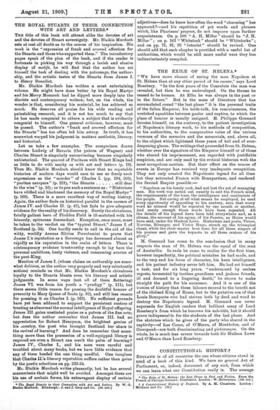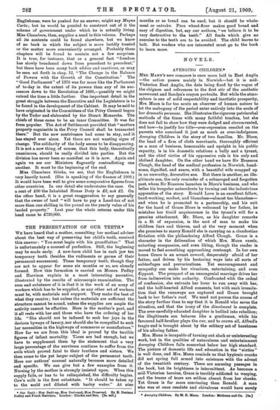CONSTITUTIONAL HISTORY.f
ENGLAND is of all countries the one whose citizens stand in need of a book of this kind. We have no general Act of Parliament, or, indeed, document of any sort, from whioh we can learn what our Constitution really is. The average • Th. Rails of St. Helena the Last Phase in Fact and Fiction. From the French of Philippe Gonnard. Illustrated. London : W. Heinemann. LIOA net.] t A Constitutional History of England. By A. M. Chamber'. London: Methuen and Co. [6,..] Englishman, were he pushed for an answer, might say Magna Carta ; but be would be puzzled to construct out of it the scheme of government under which he is actually living. Miss Chambers, then, supplies a need in this volume. Perhaps all its contents could be found elsewhere, but we know of no book in which the subject is more lucidly treated or the matter more conveniently arranged. Probably these chapters will be found to contain not a few surprises. It is true, for instance, that as a general fact "freedom Las slowly broadened down from precedent to precedent," but there have been many back eddies and reactions, as may be seen set forth in chap. 12, "The Change in the Balance of Powers with the Growth of the Constitution." The "Good Parliament" of 1376 was far more like the Parliament of to-day in the extent of its powers than any of its suc- cessors down to the Revolution of 1688,—possibly we might extend the time a little further. One important detail in the great struggle between the Executive and the Legislature is to be found in the development of the Cabinet. It may be said to have originated in the Committees of the Privy Council begun by the Tudor and elaborated by the Stuart Monarchs. The chiefs of these came to be an inner Committee. It was far from popular. The Act of Settlement provided that "matters properly cognisable in the Privy Council shall be transacted there." But the new contrivance had come to stay, and it has stayed ever since. Yet there are not wanting signs of change. The solidarity of the body seems to be disappearing. It is not a new thing, of course, that this body, theoretically unanimous, should be really divided into parties. But the division has never been so manifest as it is now. Again and again we see our Ministers flagrantly contradicting one another. It must be the beginning of the end.
Miss Chambers thinks, we see, that the Englishman is very heavily taxed. (She is speaking of the finance of 1908.) It would have been well to give some comparative figures from other countries. In one detail she understates the case. On a rent of £80 the Inhabited House Duty is £3, not £2. On the other hand, it is a great exaggeration to say generally that the owner of land "will have to pay a Land-tax of not more than one shilling in the pound on the yearly value of his landed property." Last year the whole returns under this head came to £720,000.







































 Previous page
Previous page